

Why it’s hard for students to “just turn in” missing assignments, and how to get them unstuck
Mar 29, 2023 | Blog

With the end of the semester on the horizon, many students may feel overwhelmed by low grades or feeling behind in some of their classes.
As a parent, it can be stressful to see that your student has overdue work, or get notifications from their teacher that they’re missing assignments.
It’s even more frustrating when you’ve told them over and over again how important it is to “just turn it in”…but the work is still showing up as missing.
The reality is that no matter how simple it might seem to an outside observer, doing missing work is almost never as easy as “just getting it done.” If they haven’t done the work yet, there’s a good chance that something is getting in their way.
If you can figure out what the problem is before jumping in to help them (or make them) do the work, you’ll dramatically increase your chances of success.
In our experience, there are usually 3 main reasons students resist submitting their missing work…even when it seems like “just turning it in” would be SO much easier!
Reason 1: They think it won’t make a difference
Once the due date for an assignment has passed, students often de-prioritize it and move on to focus on upcoming assignments instead. It’s tempting for students to justify this by thinking “there are lots of other assignments, missing one or two won’t matter.”
But what they often don’t realize is that because of the way most grading scales are weighted, even one or two zeros can have an enormous impact on their grade. Showing students the difference it makes to turn in just a few assignments can increase their motivation to get the work done.
Here’s an example of the difference it can make to turn in just a few missing assignments before the end of the semester:
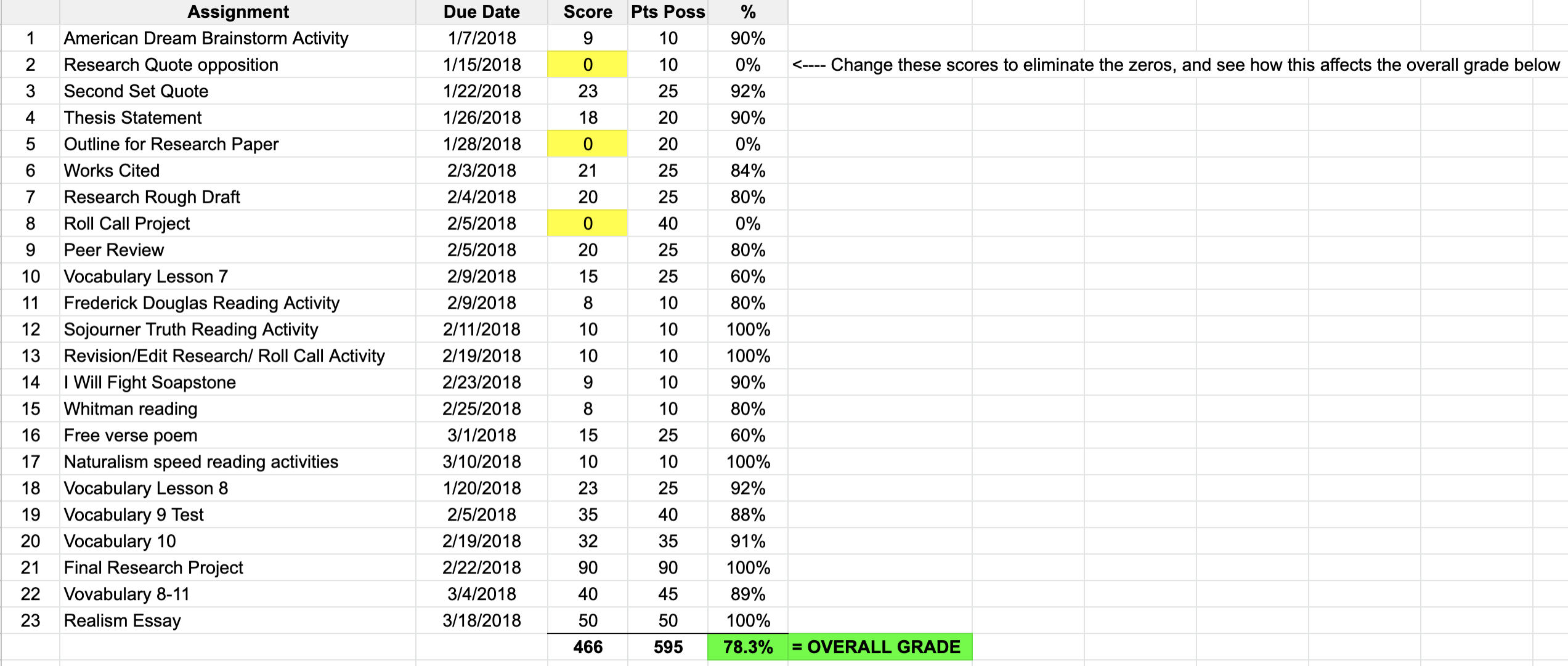
Overall grade with 3 missing assignments: 78.3%
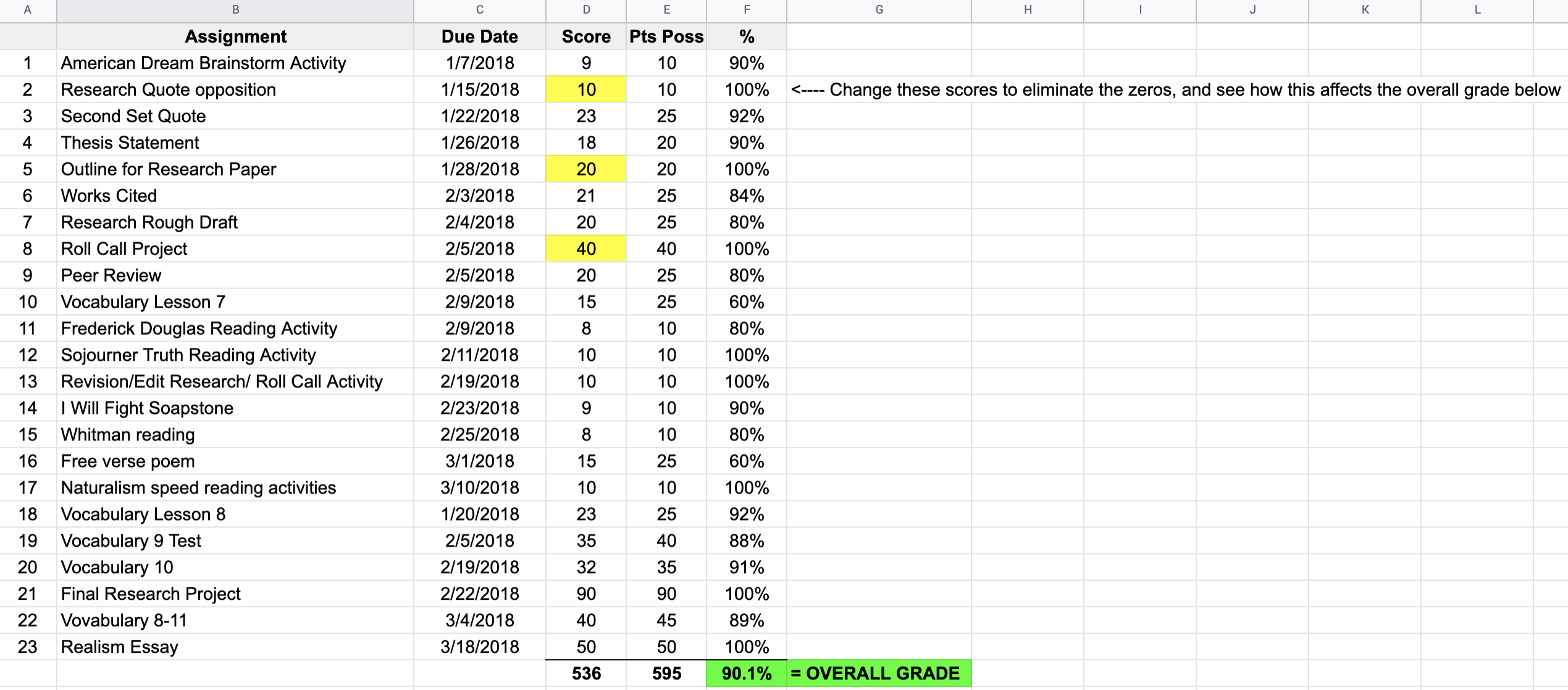
Overall grade when assignments are turned in: 90.1%
It’s hard for students to calculate these averages in their head, so it can be really powerful for them to run the numbers and see firsthand exactly how much they have to gain from making up their missing assignments.
When we do calculations like this with our students, they are almost always surprised by how much this makeup work could improve their grades, and feel much more motivated to submit the assignments when they can see for themselves the difference it will make.
Reason 2: They think it’s too late
Another reason students often resist doing makeup work is that they think it’s too late to get credit for it.
Even if they’ve done the math and know that submitting the work would make a difference in their grade, they still won’t want to turn it in if they think the teacher won’t accept it.
Especially for introverted or anxious students, it can be very intimidating to have conversations with their teachers. They might think they’ll get in trouble for asking to submit their work late, or worry that the teacher will say “no.”
The good news is that many teachers are flexible with their late work policies and allow students to turn in overdue assignments even when it is past the “official” deadline to submit them.
So if students can find the courage to ask for help, there is a good chance that their teachers will respond positively and allow them an opportunity to make up the work.
For students who are struggling to reach out to teachers, we often find it is helpful to roleplay these conversations in coaching sessions if they’re not sure what to say, or work with them to email their teachers if they’re not sure what to say.
Reason 3: They feel overwhelmed
Students who are behind on their work often have challenges keeping track of due dates, managing time, breaking down complex assignments, prioritizing work, staying focused, or following through with plans….which is why they fell behind in the first place.
These challenges can become even more daunting when they are behind in their classes, and trying to complete makeup assignments on top of their normal workload.
This can feel so stressful that a lot of students avoid or put off doing makeup work even when they know how much it would improve their grade.

For these students to get their work submitted, it’s essential to help them find ways to…
- Break down the assignments so they have a realistic plan for getting the work done that they’re confident they can actually follow through with
- Lower the stress they feel while they are doing the work so they will be less tempted to avoid it
- Visualize the progress they are making so they can see that their efforts are making a difference
Providing support
When students have a lot of makeup work to complete, having some additional support to help them work through it can be invaluable.
For some students, this may mean finding a tutor to help them with the content they didn’t understand when their teacher was first presenting the material.
For other students, having a family member or friend nearby as a source of moral support to keep them company while they are working (and a motivating reward to look forward to as soon as the work is completed) can be enormously helpful.
Other students may benefit from working with an academic coach to help them get unstuck and started on their missing work. Sometimes, having someone else who is not a family member step in to help can reduce stress and conflict at home and make it easier for students to take the steps they need to get back on track in their classes. If you think this type of support would be helpful for your student, please feel free to reach out and we’ll be happy to help!

Missing a Class: Understanding Impact and Strategies
We’ve all been there – the alarm didn’t go off, the car broke down, or you simply overslept. Missing a class can be stressful for college students, but it doesn’t have to derail your academic journey. In this post, we’ll explore practical tips for handling missed classes effectively and minimizing the impact on your learning experience. From catching up on missed material to communicating with professors, we’ve got you covered.

Key Takeaways
- Communication is Key : Regularly communicate with professors about absences and make use of available resources to stay informed about missed class material.
- Stay Organized : Develop strategies to stay on track with missed work, such as creating a detailed schedule and seeking help from classmates if needed.
- Address Academic Guilt : Understand that missing a class for valid reasons is normal and focus on catching up rather than dwelling on guilt.
- Collaborate with Classmates : Utilize the support of classmates to catch up on missed work and stay updated on class discussions.
- Plan Ahead for Future Absences : Manage future absences by notifying professors in advance and creating a plan to minimize the impact on your academic progress.
- Seek Support : Recognize the importance of seeking support from classmates, professors, and academic resources to effectively manage the consequences of missing a class.
Understanding the Impact of Missing Classes
Academic consequences.
Missing a class can lead to falling behind on coursework, ultimately resulting in lower grades. When you miss important lectures, it’s harder to understand the course material. Absences can significantly impact your participation grades and ability to engage in class discussions.
Personal Accountability Taking responsibility for missing classes is crucial for your academic success. It’s essential to acknowledge how absences affect your learning process and overall understanding of the subject matter. Being accountable for attendance demonstrates your commitment to education and personal growth.
Attendance Policies Familiarizing yourself with the specific attendance policy for each course is vital. Understanding the consequences of excessive absences will help you prioritize attending classes regularly. Adhering to these policies is essential for maintaining steady academic progress throughout the semester.
Long-Term Implications Consistent absences may hinder your overall academic performance over time. Missing multiple classes can have a cumulative effect on your learning outcomes, potentially impacting test scores and assignments negatively. Long-term implications of frequent absences include potential grade reduction and difficulty catching up with missed content.
Recognizing Valid Reasons to Miss Class
Prioritizing health and well-being is crucial. It’s important to recognize when physical or mental health issues take precedence over attending class. Seeking medical attention and communicating with instructors about health concerns impacting attendance are essential.
Personal emergencies can also be a good reason for missing a class. Communicating these emergencies promptly to instructors is vital in minimizing the academic impact. Managing personal emergencies while balancing academic responsibilities requires proactive communication and effective planning.
Juggling professional obligations alongside academics can be a valid reason for missing a class. Careful time management is necessary when balancing work commitments with academic responsibilities. Communicating professional commitments with instructors in advance allows for better management of class attendance.
Communicating with Professors
Email etiquette.
When you’re reaching out to your professors about missing a class , it’s crucial to maintain professional email etiquette. Clearly explaining the reasons for your absence in emails shows respect for your instructors’ time and demonstrates professionalism. By following proper email etiquette, you foster positive communication with your professors, which can be beneficial in the long run.
It’s essential to remember that how and when you communicate about missed classes can impact your academic journey. Understanding the timing of missed classes is key for planning effective catch-up strategies. Considering this timing when seeking additional resources or scheduling make-up sessions is vital for staying on track academically. It also helps when reaching out to classmates or instructors for support related to the missed material.
Timing Matters
Timing matters when addressing missing a class because it influences how effectively you can navigate through any challenges that arise due to being absent from class. Being mindful of the timing of missed classes allows you to plan ahead and take necessary actions promptly, preventing any potential setbacks in your academic progress.
Providing valid evidence for missing a class due to unforeseen circumstances is important as it ensures transparency and credibility in your communication with instructors. Documentation supporting legitimate reasons for missing class strengthens trust between students and instructors, fostering an understanding of unexpected situations that may affect attendance.
Strategies to Stay on Track
Obtaining notes.
Obtaining comprehensive notes from classmates is crucial for catching up on missed material efficiently. Requesting notes from reliable sources ensures accuracy and completeness of information covered during absences. Having these notes promptly after missing a class aids in staying updated with course content. For instance, if you miss a math class where the teacher introduces a new formula, having access to your friend’s detailed notes can be extremely helpful.
Reviewing Recorded Lectures
Accessing recorded lectures provides the flexibility to review missed material at one’s convenience. Utilizing recorded lectures as a supplement to class attendance supports comprehensive understanding of course content. Reviewing recorded lectures enhances retention of information covered during missed classes. For example, if you miss an important history lecture discussing key events leading up to World War II, reviewing the recorded lecture can help fill in those knowledge gaps.
Meeting with Tutors
Scheduling meetings with tutors is essential for clarifying concepts covered during missed classes. Seeking guidance from tutors helps in bridging knowledge gaps resulting from missed lectures. Meeting with tutors provides personalized support tailored to individual learning needs following absences – this could mean getting extra practice problems or explanations that align specifically with what was taught while you were absent.
Dealing with Academic Guilt
When missing a class , it’s crucial to seek support from peers, professors, or academic advisors. Engaging with classmates can help fill in the gaps from missed lectures and discussions. Forming study groups is an effective way to collaborate with others and gain a better understanding of the material.
Reaching out to professors for clarification on missed content or arranging office hours appointments can provide valuable insight into what was covered during the absence. Academic advisors can offer guidance on catching up and staying organized amidst missed classes, ensuring that students remain on track with their coursework.
Collaborating with Classmates
Study groups.
Classmates can be a great resource when you’re missing a class . Forming or joining study groups allows you to catch up on missed material by discussing the content with your peers. You can share notes, quiz each other, and clarify any confusion about the topics covered in class.
Studying in a group also provides an opportunity to gain different perspectives and insights into the class material. For example, if you miss a lecture due to illness, your classmates can fill you in on what was discussed and provide their understanding of the key points.
When studying with others, it’s easier to stay motivated and focused on catching up on missed work. The collaborative environment encourages accountability and helps prevent falling behind in your coursework.
Peer Notes Sharing
Another effective way to make up for missing a class is by sharing notes with your peers. If you’ve missed important lectures or discussions, asking classmates for their notes can help ensure that you have all the essential information from the classes you’ve missed.
Sharing classmate notes also gives you access to different interpretations of the material presented during those sessions. This diverse perspective can enhance your understanding of the subject matter and provide valuable insights that might not have been covered in your own notes.
Discussion Forums
Engaging in online discussion forums related to your course is another beneficial strategy for addressing missing a class . Many colleges offer virtual platforms where students can discuss course materials, assignments, and concepts outside of traditional classroom settings.
Participating in these forums allows students who have missed classes to ask questions about what they’ve missed while gaining input from their peers who were present during those sessions. It’s an excellent way to bridge any knowledge gaps resulting from absences.
Catching Up on Missed Work
Prioritizing tasks.
When you’ve missed a class, it’s essential to prioritize tasks based on their deadlines and importance. Start by reviewing the syllabus or asking your teacher for any handouts, notes, or assignments you might have missed. Highlight or mark the most urgent tasks that need immediate attention, such as upcoming tests, quizzes, or major projects.
Consider reaching out to classmates for help with understanding what was covered in the missed class. They can provide insights into key topics discussed and share any additional materials used during the lesson. By prioritizing tasks effectively and seeking support from peers, you can ensure that you address critical assignments first while efficiently catching up on the material covered.
Time Management
To catch up on missed work successfully, practice effective time management skills by allocating specific time slots to tackle different subjects or assignments each day. Create a schedule outlining when you will review notes from the missed class, complete related homework, and seek clarification on challenging concepts.
Break down larger tasks into smaller chunks to make them more manageable within your study sessions. For example, if there are multiple chapters of reading to catch up on for a subject like history or science, allocate dedicated time slots over several days rather than trying to cover everything in one sitting. This approach allows for better retention of information and reduces feelings of overwhelm when faced with an extensive amount of makeup work.
Additional Resources
Utilize additional resources such as online tutorials, educational videos related to the topic discussed in class; these can provide alternative explanations that may resonate with your learning style better than traditional classroom instruction alone. Websites offering practice quizzes and interactive exercises tailored to specific subjects can also be valuable tools for reinforcing understanding and knowledge acquisition outside of regular classroom hours.
Managing Future Absences
Planning ahead.
When missing a class , it’s crucial to plan ahead to stay on top of your schoolwork. Start by reviewing your syllabus and marking important dates, such as exams or project deadlines. Once you know when you’ll be absent, talk to your teacher in advance. Ask for any materials that will be covered during your absence so you can work on them ahead of time.
Consider forming a study group with classmates who can provide notes or insights from the missed class. Utilize online resources like educational websites or videos related to the topic discussed in class. This proactive approach ensures that you have access to all necessary materials and are prepared for upcoming assignments and tests.
Staying Informed
To effectively manage future absences, staying informed is key. Make use of technology by setting up reminders on your phone for upcoming due dates and scheduling study sessions before returning to class. Stay connected with reliable classmates who can update you about any changes in the syllabus or assignments during your absence.
Furthermore, consider joining an online discussion forum related to your course where students share notes and discuss topics covered in class. By staying informed through digital platforms, you can keep track of what’s happening in class even when physically absent.
Balancing Commitments
Balancing commitments is essential when dealing with missing a class due to other obligations or activities outside of school. Prioritize tasks based on their urgency and importance while ensuring that missing one commitment doesn’t negatively impact another.
Create a schedule that allows time for catching up on missed work without overwhelming yourself amidst other responsibilities such as extracurricular activities or family commitments.
Final Remarks
You’ve now gained valuable insights into the impact of missing classes and learned effective strategies to mitigate its consequences. By understanding valid reasons for absences and learning how to communicate with professors, you can navigate missed classes more effectively. Remember, collaborating with classmates and managing future absences are essential steps in staying on track academically. So, take charge of your education, implement these strategies, and watch your academic journey flourish.
Don’t let guilt or anxiety hold you back. Instead, use the tools and tips provided to conquer the challenges that come with missing class. Your proactive approach will not only keep you on the right path but also empower you to excel in your academic pursuits. Now go out there and make the most of your educational experience!
Frequently Asked Questions
Is it okay to miss a class.
It’s important to prioritize your well-being, but missing class can impact your learning. Consider the reasons for your absence and communicate with your professors.
How can I catch up on missed work?
Reach out to classmates or utilize resources provided by the professor. Create a plan to systematically tackle the missed material without overwhelming yourself.
What should I do if I feel guilty about missing a class?
Acknowledge that everyone faces challenges, including academic ones. Focus on developing strategies to prevent future absences and effectively manage any guilt you may feel.

How can I communicate with my professors about missing a class?
Be honest and proactive in communicating with your professors. Explain the reason for your absence and inquire about any missed material or assignments.
What are some effective strategies for staying on track after missing a class?
Utilize tools such as online resources, notes from classmates, and scheduling regular study sessions to ensure you grasp the content covered during your absence.
Read Also –
- Bad Grades: Unpacking Strategies for Academic Recovery
- What Happens if I Fail a College Class: Understanding the Impact and Navigating Recovery
- Sick Email to Professor: Crafting Your Absence Explanation
- How to Email a Professor About Missing Class: Crafting Your Polite Request
Leave a Comment Cancel reply
Save my name, email, and website in this browser for the next time I comment.
- Grades 6-12
- School Leaders
75 Frightfully Fun Halloween Activities 👻
This Teacher’s Policy Cuts Down on So Many Missing and Late Assignments
Could an automatic 48-hour grace period for all assignments be the key to eliminating missing and late assignments?

Ask any middle or high school teacher what the number-one hassle is when it comes to grading, and inevitably they will end up talking about late work. Even in the post-pandemic classroom, teachers are grappling more than ever with the twin challenges of missing and late assignments. It’s a battle that can feel as endless as grading itself. But what if there were a policy that not only reduced these issues but also eased your workload? Enter this innovative resubmission policy from We Are Teachers beloved TikToker @strategicclassroom !
This teacher’s time-saving hack? A 48-hour grace period that cuts down drastically on missing and late assignments.
Originally, she discusses using this policy for her college and high school students. She crafted it to streamline the extension-request process that was flooding in during the 12- to 48-hour window post-deadline. She decided to create a buffer rather than sifting through individual requests. The result? This 48-hour grace period allows students to submit work without needing an extension and still have their submissions considered on time.
How does this policy work?
- No need to ask for extensions. Students can turn in assignments up to two days after the deadline. This window provides students the flexibility to manage their workload more effectively across all their subjects.
- Option to resubmit for a higher grade. As long as students meet the initial deadline or the extended window, they are eligible to resubmit work for a higher grade.
- No additional work for the teacher! You’ll have way fewer students to hunt down if they already have a grace period.
Why this policy for missing and late assignments makes a difference
The beauty of this approach lies in its simplicity and the autonomy it grants both educators and students. For educators, it means fewer administrative hassles and more time focused on teaching rather than managing deadlines. For students, it provides a realistic buffer to plan and prioritize without penalty, crucial in managing the diverse pressures of academic life.
While this policy works wonders at the college level, it might need tweaking for high school settings depending on district policies. The principle, however, remains powerful: Allow students a window to manage their time effectively, which encourages them to at least turn in something rather than skip the assignment altogether.
Potential challenges and consideration
- Abusing the policy: Setting clear expectations and consequences for repeated misuse of the grace period is essential. Teachers need to ensure that students understand that this policy is not an invitation to procrastinate but a measure designed to help manage unforeseen circumstances.
- Communication needs to be crystal-clear: It’s crucial that students understand this policy isn’t a form of leniency but rather a strategic tool for managing their educational responsibilities more effectively. Educators must clearly communicate the intent behind the grace period and how it should be used appropriately.
- Consider the impact on student learning: Consider if the assignment is crucial for current learning and whether late completion will still benefit the student’s understanding.
- Student circumstances: Acknowledge that external factors can affect a student’s ability to meet deadlines. A flexible policy can accommodate these without compromising academic integrity.
This approach has changed turning in assignments from a point of stress to a manageable part of classroom life. It’s a testament to the idea that sometimes, giving a little can benefit you a lot in student responsibility and engagement. Curious to see how @strategicclassroom explains this policy in her own words? Check out her TikTok here for more insights:
@strategicclassroom Breaking down my resubmission policy here. Want my resubmission form + syllabus wording of this policy? You can grab it in my f r e e resource folder 🫶🏻 #redopolicy #teachertok #classroommanagement #latework ♬ original sound – Jen | Teacher Time Hacks
You might be wondering, “If there’s always a 48-hour grace period, won’t students just habitually turn in assignments late?” While it’s a valid concern, many teachers who implement this policy view it as a trust contract with their students. It demonstrates that as a teacher, you are willing to offer grace under any circumstances.
What are your thoughts? We’re eager to hear how you have implemented similar policies in various classrooms. Have you adopted a similar approach? How have you tailored policies for missing and late assignments, and what impact has it had? How would a redo policy function in your classroom setting?
Come and share your thoughts in our We Are Teachers HELPLINE group on Facebook!
Looking for more articles like this be sure to subscribe to our newsletters .
Copyright © 2024. All rights reserved. 5335 Gate Parkway, Jacksonville, FL 32256

Give Fs for Missing Grades Instead of Zeros
Because of the way averages work, it's hard to overcome a zero..
Posted September 30, 2022 | Reviewed by Vanessa Lancaster
- What Is a Career
- Take our Procrastination Test
- Find a career counsellor near me
- Report card grades should measure students' overall performance and knowledge.
- When calculating a grade by averaging performance, more extreme values are weighted more heavily than those close to the mean.
- Because grades typically run from A to F (100 to 50), giving students a zero for a missed assignment significantly affects their grade.
- Assigning a 50 instead of a zero penalizes missed assignments but balances the possibility of bringing a grade up.
Report card grades are supposed to measure how well students have performed in class.
- Performance is a construct: What we are trying to measure.
- Report card grades are measures: They mean to capture the construct.
If grades are valid , people with high grades will perform better than those with lower grades. Although we hope that grades also reflect learning–people who learned more have higher grades–we know that's not always true. Being sick, having a chaotic home that makes it hard to do homework or study, or reading ability can all affect grades differently than they affect learning.
Measures of Central Tendency
Report card grades typically reflect central tendencies. Measures of central tendency are intended to be a single number (or grade) that captures the full construct (performance). A report grade usually captures several different assignments, which often vary.
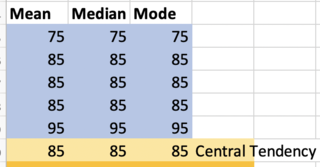
Psychologists use three indicators of central tendencies–the mean, the median, and the mode. Each minimizes a different type of error.
- The mode is the most common value. In the figure below, students have five grades: a 75, three 85's, and a 95. If you had to guess what grade someone got on an assignment and said "85," you'd be wrong fewer times (have less error) with that guess than by guessing anything else.
- The median is the value that is in the middle of the distribution. If you use "85" to reflect how well a student did, you are wrong by 10 points for their 75, by 0 points for all three 85's, and you're wrong by 10 points for that 95 they got. In other words, your summed error is 20. The median minimizes summed error.
- The mean or average is when we take all the numbers in a distribution, add them together, and divide by how many numbers there are. Have you ever considered why that is a good measure of central tendency? What the average does is minimize summed squared error. So your "error" for a mean of 85 and a grade of 75 is 10. For 85, it is zero, and for 95, it is 10. The squared error is thus 10 2 + 0 2 + 0 2 + 0 2 + 10 2 : 200. No number will give you a smaller summed square error than the mean.
Because you are squaring errors to determine the mean, it is sensitive to outliers (sensitive to values far from the center). That's why many of us were taught always to use means unless a distribution was very lopsided .
When a distribution is lopsided, you have large errors. When you have large errors in lopsided distributions, most of us were taught that's when you use medians. In other words, means are the standard because they are the 'fairest'. Medians were invented to fix this unusual problem means have. That's not actually the case. Medians minimize error. Means minimize BIG errors. We are weighting large errors by squaring them and moving the mean until we find the number that does that best.
I understand means, medians, and modes. What’s that got to do with giving zeros for missing assignments?
In the figure above, if you calculate a report card grade using the mean, median, or mode all, you will get the same grade–an 85 or B.
Let's look at what happens if a student misses an assignment, and the teacher uses an average to compute their grade.
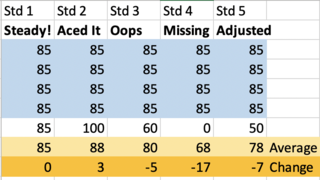
In this example, the students got 85s on the first four assignments. What happens on Assignment 5?
- Student 1 got an 85 on Assignment 5 and earned their expected 85.
- Student 2 aced it! They got a 100, raising their grade from an 85 to an 88 (a three-point gain).
- Student 3 did poorly on Assignment 5, earning a 60. This dropped their report grade by five points to an 80.
All of these changes are more or less what we expect.
But now look at Student 4, who missed the last assignment. They were assigned a zero. This dropped them a full 17 points (from 85 to 68).
Notice that doing as well as possible–getting a 100 like Student 2–can only raise your grade by three points. However, doing as poorly as possible– skipping the assignment–drops your grade by 17 points.
Why? Because averages are very sensitive to outliers. One hundred is only 15 points higher than the average of the first four grades. It is relatively close to the central tendency. On the other hand, a zero is a full 85 points lower. It has a very large error, and the average has to move a lot to minimize the sum squared error.
That's because the functional range of grades is not zero to 100. No teacher I've ever seen has a class with an average of 50 and a range from zero to 100. Instead, most teachers hope for an average of perhaps 85. In reality, grades go from F (a 50) to A+ (100). That's the functional range for grades.

What if we assigned the lowest grade in the functional range for missing assignments instead of a zero?
As I wrote in the beginning, grades are meant to assess performance. What would happen if we assigned a solid F for missing grades? In other words, what if we assigned 50s for missing grades instead of zeros? Look at the last column, with Student 5. When assigned a 50, Student 5's grade drops seven points after the last assignment–from an 85 to a 78. That's a significant penalty but not insurmountable.
Is assigning students 50s for missing grades instead of zeros fair? Let's look at the students. The student who got four Bs and a D (Student 3) would earn an 80 on their report card (B-). The student who got four Bs and missed the last assignment and got a 50 for it (Student 5) would earn a 78 (C+). Had that student's teacher followed the more standard practice of assigning a zero for the missing assignment, they would have earned a 68 (D+).
Deciding how to calculate grades needs to reflect the teacher's belief about which grade best reflects the student's performance. It needs to be consistent across students–unbiased. But given the functional range of grades 50 to 100, there is an argument to be made that counting missing assignments as 50s produces fairer grades than assigning them zeros.

Nancy Darling, Ph.D. , is a professor of psychology at Oberlin College.
- Find a Therapist
- Find a Treatment Center
- Find a Psychiatrist
- Find a Support Group
- Find Online Therapy
- International
- New Zealand
- South Africa
- Switzerland
- Asperger's
- Bipolar Disorder
- Chronic Pain
- Eating Disorders
- Passive Aggression
- Personality
- Goal Setting
- Positive Psychology
- Stopping Smoking
- Low Sexual Desire
- Relationships
- Child Development
- Self Tests NEW
- Therapy Center
- Diagnosis Dictionary
- Types of Therapy

It’s increasingly common for someone to be diagnosed with a condition such as ADHD or autism as an adult. A diagnosis often brings relief, but it can also come with as many questions as answers.
- Emotional Intelligence
- Gaslighting
- Affective Forecasting
- Neuroscience
Three Teachers Talk
Teacher-Mentors with Insights, Ideas, and Resources for Secondary Readers & Writers Workshop
- Contributing Writers
- Professional Development
- Our Mission
- #PoetryChat Archives
How to deal with missing & late-work: one teacher’s approach
Hey readers! It’s been a while since you’ve seen anything from us at Three Teachers Talk. We, like all of you, feel like we’ve been trudging through this year. Between the zooms, the Nearpods, the screencasts, the quarantines, the cleaning protocols, the bandwith issues…well, you get the picture. It’s been a lot.
Now we’re at the half-point of this year and so many are struggling with engagement. How do we “hold kids accountable” in the midst of all this? And what can we learn that might go beyond the crisis teaching we’re doing now? I’ve been loving following Tyler Rabin’s (@tylerrabin) journey around these issues and invited him to share his thinking with all of you.
We hope you’re safe. We hope you’re well. We hope this helps.
I’ve gone through this cycle more often than I’d like:
- Realize that grade penalties on late work are bad.
- Eliminate all grade penalties.
- Immediately get overwhelmed by late work and a lack of organization.
- Rush to reimpose late penalties.
I would argue that in most classrooms, grade penalties don’t exist because the teacher likes them; grade penalties exist because we don’t feel like we have an alternative.
On top of that, they work. For some things. The things they work for are the easily visible pieces. Do students hand more things in with grade penalties than without? Typically, yes.
But, let’s also point out some of the things we know about how extrinsic motivators, especially punishments, impact student learning. This blog captures some of the key points from Daniel Pink’s work on motivation well, and the first point that we have to be aware of is that, while extrinsic motivation does increase short-term motivation, it actually hurts it long-term. This means that we can use it once or twice to convince someone to do something, but eventually that ends up no longer being motivating. Sound like any students you’ve had?
The second piece is the more concerning piece. Extrinsic motivation increases someone’s drive to complete basic tasks, but it hinders their ability to engage in complex process. Correct me if I’m wrong here, but I believe learning falls under the latter category. While I wish I could put this softly, I don’t know a way around the harshness of this fact: an emphasis on late penalties values compliantly completing a task more than it does the student’s ability to learn.
Now, here’s where we are stuck between a rock and a hard place. Late penalties are, in essence, a barrier to learning, but in most cases, there doesn’t appear to be a sustainable alternative for teachers. We don’t want to have to use grade penalties, but we are human. We need to have lives, and the constantly ebb and flow of late work is exhausting and time-consuming.
This concept was weighing heavily on me a few months back. I too often criticize the act of using grade penalties without acknowledging the reality of our context or providing possible solutions. As I wrestled through this in an attempt to provide a solution, I recorded the most helpful info I could into the longest thread I’ve ever posted on Twitter. However, as it always goes on Twitter, it lacked the depth the conversation needs.
As such, I’ve broken the thread into segments so that I can provide additional details about how to address the late work issue in meaningful ways without using grade penalties and without losing your sanity.
Part 1: Organizing Assignments into Essential vs. Non-essential

This Tweet probably needs the most explanation. If you remove grade penalties and allow students to turn in ALL their work whenever they want, you will lose every ounce of free time you have. The key is to really identify the assignments that carry the most value. This isn’t to say that the non-essential assignments aren’t valuable, but the non-essential assignments should mean that their function is to allow students to practice specific skills and demonstrate their current level of understanding. They should have more than just that one opportunity to do that for each skill. But…I’m getting ahead of myself.
Part 2: Non-essential Assignments – Multiple Attempts for Learning

The key with these assignments is that the student will have further opportunities to demonstrate their learning, but these missed assignments demonstrate a need for a different type of support, a support that grade penalties just frankly don’t offer. For your sake, don’t take late work that falls into this category. Tell the student that they missed this opportunity, but they will get another shot at it later. However, if you end there, kids will receive the message that every educator fears: deadlines and completing assignments aren’t important.
This is why there must be a system or process set up to hold students accountable in a way that actually focuses on building those skills. Like I mentioned, my favorite is to have them stay after class and schedule their week with me. I can also put them on my list of students who receive my Remind messages about upcoming assignments. Somehow there has to be a clear next step for students who miss these assignments so that they know (a) you’re paying attention, (b) it’s important, and (c) you want them to get better at self-management and executive functioning.
Part 3: Final Evaluation

All of this comes down to the fact that we should be averaging scores over time to determine a final score. Not only does that result in an inaccurate report of student learning, but it means that missing assignments will almost inevitably factor into the final grade (unless you drop scores, which I’m always a proponent of).
At the end of a term, the goal is that you are doing a summative evaluation (preferably with the student) where you are looking through their data to determine their final scores. If this step isn’t happening, missing and late work usually ends up being a significant factor in a student’s grade.
Now, I know a lot of people are thinking, “What about the student who doesn’t turn in ANY work?!” At some point, a lack of evidence is a lack of evidence, and that student hasn’t given you enough to demonstrate proficiency in the skill. I have found that this happens WAY less often than we think it does, though.
Part 4: Authentic Consequences for Authentic Assessments
Tweets:

While I probably don’t need to elaborate here, I want to make sure one word shines through: authentic. How are we creating experiences where students get to apply their learning in authentic ways so that the cost of not doing something is actually meaningful for the student? Is this a one-size-fits-all thing? Absolutely not. For a consequence to be meaningful, there must be an element of choice in it. The student has to have had some control and ability to bring in their full self – their passions, interests, goals, etc – to the project. That is when the consequences become powerful.
Part 5: Final Thought

This is why I get so worked up about grade penalties. I know we do them because it feels like we don’t have an alternative, but so often these grade penalties are just kicking a horse who’s already down. These are students who often have already been told they’re bad at school, maybe not explicitly, but the message has been sent over and over. They don’t need another reminder that they can’t do it. We teach them nothing when we add penalties on top of self-doubt. What they need is someone who notices they are struggling, but instead of blaming the student and calling it good, that person goes, “Here’s how we’re going to do better next time. Let’s let this one go and move forward together.”
This is why we have to stop depending on grade penalties. They are a way of washing our hands of the responsibility of educating our kids, of helping them see their best selves. We can do better. It’s not easy, but we can do it, one small change at a time.
Tyler Rablin is a current instructional coach and National Board certified high school language arts teacher in Sunnyside School District in Sunnyside, WA. On the side, he is a consultant with Shifting Schools, contributing writer for Edutopia, and a Google for Education certified trainer. His educational passion is focused on the ways that meaningful technology integration, modernized assessment strategies, and strong cultures of learning can allow us to provide meaningful, powerful, and personal learning experiences for each of our students. In his personal life, he enjoys reading, running, and spending time hiking and camping with his wife and two dogs.

Share this:

Tagged: Grading , late work , standards based grading
What are you thinking? Cancel reply
I love this blog. sign me up..
Email Address:
Give Me More Posts Like This
Join the conversation on Facebook
I Wonder If They Talked About…
Top talking points.
- Simple Annotation Strategies to Help Students Comprehend Informational Text
- Using Scrum in the Classroom
- Mini-Lesson Monday: Imitating Poetry
- Advice Poems: A Way to Wrap-Up
- Poetic Rhetoric -- Spoken Word Poems in AP Lang
- Lyric Mashup Poetry: Synthesis & Reflection on Beautiful Words
- Our Day One Writing: Personal User Manuals
- Mini-Lesson Monday: Plot Pyramids in Reading and Writing
- 10 Things Worth Sharing Right Now
- A Writing Workshop Lesson: Inspirational Speech
I HOPE THEY TALKED ABOUT…
This slideshow requires JavaScript.
Follow 3TT on Twitter
- Already have a WordPress.com account? Log in now.
- Subscribe Subscribed
- Copy shortlink
- Report this content
- View post in Reader
- Manage subscriptions
- Collapse this bar
Missing Assignments--and the Real World
- Share article
It’s a story that every teacher has heard--and if they’ve been in the classroom for a couple of years, recognizes from personal experience:
The teacher is relatively new, and working hard to build an effective practice (in this case, a band program). She goes away for three days, to a conference, leaving behind sub plans which involve sending students to the computer lab to craft a PowerPoint on composers. Only five of her 67 students submit any work. Her question to the Band Directors Group professional network: How do I not freak out on Monday? How do I handle this?
The post hit a nerve--she has about 50 responses so far. What’s surprising to me is how many are bent on blame and punishment: What an incompetent sub! Give ‘em all zeros! Candy and a free day for the five compliant ones! Make sure your administrator backs you up, then nuke ‘em--that’s how they learn.
Just what they learn from these retaliatory strategies--or the impact on a young teacher trying to nurture enthusiasm and membership in a school music program--seems unimportant. Kids blew off an assignment--make sure their grades reflect that choice. (The words “choice” and “choose” appear frequently in the comments.) Get tough. They deserve it.
I once wrote a blog about a similar experience I had as a teacher. I assigned a big project, giving my students six weeks to complete it, and a lot of what teachers call scaffolding: things to read, ideas to help them select and shape their work, graphic organizers and outlines, the option of working singly or together. I had more than 300 students at the time, and over 90% turned the project in on time.
When the work was turned in, I realized it would take me weeks to read/listen to the projects, provide feedback and grade them. I offered the 25 or so students who hadn’t completed the project a grace period of a week to turn something in--since I wanted to make sure they engaged with the assignment’s materials and ideas. All but one or two of the original non-completers finished the work--and what was submitted was mostly of acceptable quality. A handful were top-notch. I also got a couple of thank-you messages from parents.
That blog also drew a lot of ire. From teachers. The word most teachers chose was “unfair"---unfair to the kids who did the work on time. Unfair to let students think they would get a reprieve in the (here it comes) real world. Unfair to other teachers, who insist on meeting deadlines and punish kids who don’t.
I’ve been musing about this. These are the questions that emerge for me:
- What were the teacher’s learning goals for this assignment? Were they communicated to the students? If the goal was “keep kids busy and out of the band room for three days,” then the outcome was predictable, even if not defensible.
- How do our students--all our students, from kindergarten to Chemistry--perceive classes taught by substitutes? What do teachers say to their students about subs and days when they must be absent? What do teachers say to their students about what can be accomplished with three days in a computer lab?
- What does it tell our students when compliance matters more than acquiring knowledge or skills? When getting a good grade becomes the only goal?
- How “unfair” is it to students who must work or mind siblings, that other students have long blocks of discretionary time available for schoolwork? Can we ever provide equitable opportunity for all students, equitable access to time and materials for optimum learning?
The two mega-issues that emerge whenever teachers talk about missing assignments and justifying their actions toward late work are grades--always grades--and the idea that we owe kids “real” experiences to prepare them for the big, bad world where they will be presumably be working in a few years. Paul Thomas , in an excellent piece on grading and late work has this to say:
In my 30-plus years as an educator at nearly every level possible, I witness daily teachers and professors who fail to meet deadlines (regularly); talk, do other things (grade papers), stare at their computers/smart phones, etc., during meetings; and behave in a number of ways that they do not tolerate by students in their classes, behaviors that negatively impact students' grades. I also drive daily with adult motorists who exceed the speed limit without any punishment--as most of us have come to realize a grace zone of staying less than ten mph over that limit. In other words, the real world of rules is much fuzzier than the rules of formal schooling.
My fellow Education Week Teacher blogger Starr Sackstein has been pushing educator thinking on grades for years. She also had a brilliant blog on late work last week, where she wrote this:
As I have moved away from grades, one things I've noticed is that learning takes time and for different children, it takes different amounts of time. Doesn't mean they aren't learning. Doesn't even mean they are purposely not working. It just means they have a different process. Students like this require more time and there is no reason not to give it to them. The goal is by the end of the year that he will have achieved mastery in the skills and standards of the class. Not necessarily right now when the teacher determines it should be ready.
In the case of the young music teacher and the chorus of “Off with their heads!” that followed her post--a lot the recommendations felt like habitual, unexamined teacher practice: I always give half-credit for one day late OR I wouldn’t waste important class time talking about it--just tell them to check the on-line gradebook.
The only upside I see is that the novice teacher who asked for help got it--and there was enough variety in the responses to prove that there is no one right way to address common problems. I wish her well. And I’m guessing she won’t use the assignment again.
The opinions expressed in Teacher in a Strange Land are strictly those of the author(s) and do not reflect the opinions or endorsement of Editorial Projects in Education, or any of its publications.
Sign Up for EdWeek Update
- Student Data Platform
- - Data Dashboards
- - Data Warehousing
- - Data Integrations
- Advisory Services
- Strategic Decision-Making
- Progress Monitoring
- Family Engagement
- Public Dashboards
- Interactive Demo
- Why Schoolytics
- Resource Hub

4 strategies to get those missing assignments turned in

Published: May 13, 2022
As we get closer and closer to the end of the school year, it happens as reliably as the changing of the seasons—students notice the late, missing, or forgotten assignments that might have a real impact on their grade.
Sound familiar?
Most teachers spend too much valuable time toward the end of the school year reminding students about their missing assignments. This process doesn’t have to be time-consuming or painful though.
Here are 3 simple and repeatable tips to help classroom teachers encourage students to—finally—submit those late, missing, or forgotten assignments.
1. Help students manage their own assignment completion
There’s no better way to promote accountability than to help students to keep track of and manage their own assignments list. LMS tools like Schoology or Google Classroom make the process easier than ever before.
With clear assignment instructions and due dates, every student can log into their LMS and see a clean list of which assignments have been turned in, and which are still outstanding—even if they miss a class!
2. Get parents, families, and caregivers on board to help keep students on track
One of the best ways to keep students from getting too far behind is to recruit the champions they have outside school. When parents and guardians are kept in the loop about the assignments that are upcoming—along with expectations and due dates—they can help students avoid missing assignments well before the due date.
Keeping parents and guardians aware when assignments become late or get entered as missing increases the likelihood that assignment will get completed too. The Parent/Guardian Portal in Schoolytics gives parents and guardians easy access to student assignments in each of their classes. There are even reminders you can automate when an assignment is late or counted missing.

3. Send automated reminders when assignments are past due
You know what they say about an ounce of prevention…
Setting up a Schoolytics account and syncing it with your Google Classroom ( remember: it’s free to sign up! ) lets teachers set up an automated report of late or missing assignments. You never have to click into each Classroom for assignment details!
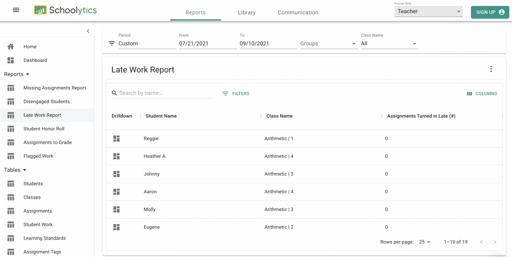
You can even set up automatic reports for late or missing assignments—Friday late work roundup anyone? And now you can send a bulk reminder to every student with a link to their missing work.
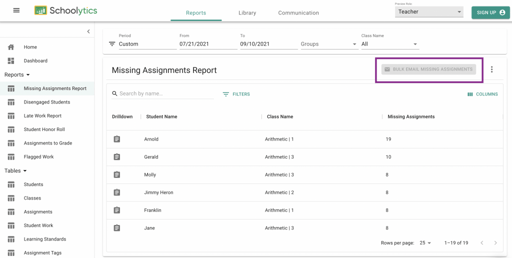
4. Try a new communication method
Each generation of students is more online than the last, and Gen Z is spending most of its time on video-forward platforms like YouTube and TikTok. As teachers, we can either fight this reality or lean into it in our communication with students.
The good news is that the rise of online video has coincided with the advent of easy-to-use video creation tools, making it easier than ever to create engaging videos for free. Tools like Veed are great for trimming videos and testing your webcam to ensure you get the perfect take to keep students engaged and on top of their assignments.
In conclusion...
These interventions make it quick and simple to keep students on track for assignment completion. And they reduce the headache for teachers to have to manage chasing down late or missing assignments.
Have any other tips for helping keep late and missing assignments under control? Let us know on Twitter at @Schoolytics
Related Articles
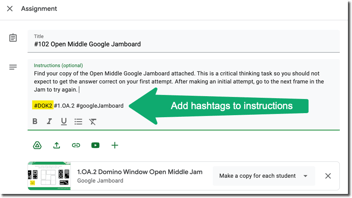
How to Track Critical Thinking

6 Google Classroom Tips To Help You Work Smarter (Not Harder)

5 Ways to Use the New Featured Image in Google Classroom

COMMENTS
If your course contains numerous graded assignments of equal difficulty, and if it is equitable for students to choose to ignore a course module by not studying or taking the exam, you should consider this process.
Depends on the assignment. If it’s a project that weighs 15% of your grade, then missing it’s going to make it harder (but not impossible) to pass your class. If it’s homework that weighs 10% of your total grade, and you get like 100 assignments per semester, then you’ll be fine. 18.
Overall grade when assignments are turned in: 90.1%. It’s hard for students to calculate these averages in their head, so it can be really powerful for them to run the numbers and see firsthand exactly how much they have to gain from making up their missing assignments.
Missing a class can lead to falling behind on coursework, ultimately resulting in lower grades. When you miss important lectures, it’s harder to understand the course material. Absences can significantly impact your participation grades and ability to engage in class discussions.
Even in the post-pandemic classroom, teachers are grappling more than ever with the twin challenges of missing and late assignments. It’s a battle that can feel as endless as grading itself. But what if there were a policy that not only reduced these issues but also eased your workload?
To be clear, a student could have 15 total 85s in the grade book and one missing assignment (traditional zero), and their grade would still be C because of the way that zero mathematically affects the grading system.
Because grades typically run from A to F (100 to 50), giving students a zero for a missed assignment significantly affects their grade.
Not only does that result in an inaccurate report of student learning, but it means that missing assignments will almost inevitably factor into the final grade (unless you drop scores, which I’m always a proponent of).
How do our students--all our students, from kindergarten to Chemistry--perceive classes taught by substitutes? What do teachers say to their students about subs and days when they must be...
Here are 3 simple and repeatable tips to help classroom teachers encourage students to—finally—submit those late, missing, or forgotten assignments. 1. Help students manage their own assignment completion. There’s no better way to promote accountability than to help students to keep track of and manage their own assignments list.